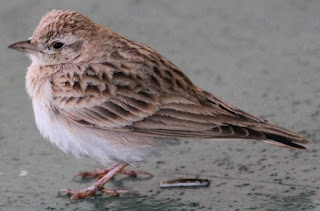The way things transpired with our work plan yesterday, meant that I could have my first lie-in of the voyage and so my alarm went off at 08:00 instead of 05:30. (local time). Normally this would be bliss, however as soon as I walked on deck I realised that this was not a day for loafing. Light southerly winds had encouraged far more visible migration than in recent days and a mixed bag of goodies were flitting around the deck. The spell between 08:30 and 12:00 gave a count that included 2 willow warblers, a probable (western) orphean warbler, a chiffchaff, 3 yellow wagtails, 2 turtle doves, a great grey shrike, a swallow, a subalpine warbler, and a short- toed lark!
 |
| western orphean warbler? |
 |
| Great grey shrike |
 |
| turtle dove (head partially shaded) |
 |
| leggy yellow wagtail |
The turtle doves, although a little nervous were relatively approachable and seemed to be quite comfortable sitting in the heat of the day and unbearably bright sunshine. More interesting for me however, was watching the yellow wagtails strut their stuff on the decks as they chased flies. They just looked so leggy!
The next LBJ caused me quite a bit of strife in trying to suss its identification. I knew it was a 'new' bird for me and after much deliberation I eventually settled for short- toed lark (after getting an ID assist from my Ullapool based, birding friend Richard Rafe), - based largely on the way in which the tertials extended to the ends of the primary feathers, couple with the slight 'capped' effect. I have never seen a short toed lark before so two WP ticks in a day at sea is pretty good going for me! Hopefully I'll get these birds on my UK life list sometime!
The next LBJ caused me quite a bit of strife in trying to suss its identification. I knew it was a 'new' bird for me and after much deliberation I eventually settled for short- toed lark (after getting an ID assist from my Ullapool based, birding friend Richard Rafe), - based largely on the way in which the tertials extended to the ends of the primary feathers, couple with the slight 'capped' effect. I have never seen a short toed lark before so two WP ticks in a day at sea is pretty good going for me! Hopefully I'll get these birds on my UK life list sometime!
 |
| short-toed lark |
 |
| tertials extending to primary tips despite extensive wear |
Unfortunately we had a scheduled helicopter arrival at 13:00 which 'encouraged' most of our visitors to continue their journey onwards for europe. I did however see a yellow wagtail and the lark settling down under the helideck in the failing light and I glimpsed what was probably the orphean too.
Today has been fairly similar. This mornings tally included 6 turtle doves, 2 yellow wagtails, 2 kestrels, 1 sedge warbler, 1 willow warbler, 1 wheatear, 1 subalpine warbler, 4 feral/racing pigeons and a skylark. The orphean warbler put in a brief appearance too.
 |
| willow warbler |
Mayhem is the only word I can use to describe the reaction of the migrants with the arrival of two kestrels that repeatedly circled the ship and occasionally settled to watch the antics of the small passerines. Interestingly, the turtle doves all took off en-mass when the falcons arrived, but the bulkier feral pigeons hardly gave them a second glance and remained sitting on the heli-deck throughout the repeated fly-pasts.
The wheatear seemed comfortable out in the open and occasionally crouched in the heli-deck netting during the frequent falcon sorties.
 |
| wheatear |
A very enjoyable couple of days- apart from the fact that there were no seabirds or cetaceans.
Stop press: The Orphean warbler is deceased- caught this evening by one of the marauding kestrels- and there I was hoping it was heading for the Scottish highlands! :(
 |
| kestrel eating orphean warbler |



Fantastic to see/hear how these birds use your vessel as a staging post! Never even heard of an Orphean warbler, and now the only one I've ever seen, is now no longer - Ah well, even Kestrel have to eat something :(
ReplyDeleteKeep up the good work!
Yes I have been lucky to see a variety of birds on a number of ships over the years. Orpheans are generally restricted to areas around the Med. and I cannot recall a report of one in the UK in decades? Thanks for reading and nice to get some feedback. ;)
Delete